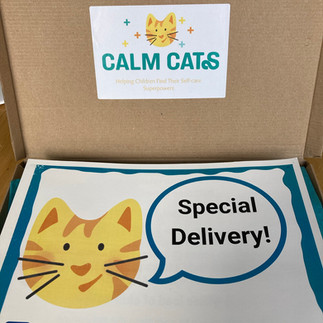Helping Children Find Their Self care Super Powers
- Hannah
- Sep 29, 2021
- 4 min read
Updated: Oct 21, 2021
Self-care is a hot topic for adults. We’re always being told we need to look after ourselves, do something for us, have some down time, me time, we can’t pour from an empty cup. But what about our children?
We live in a time where there is immense pressure on our children and young people. School children face high expectations of not just fitting the mould but meeting targets, learning in a way that doesn’t take into account the neuroscience of child development, peer pressure, testing and exams.

There are children with SEND in school with inadequate support for their learning and their needs both inside the classroom and within the family home. There a large percentage of children in schools with an undiagnosed learning need which if left undiagnosed can have a huge impact their mental health. 80% of dyslexic children are undiagnosed. Dyspraxia is often undiagnosed and unrecognised although it is thought that between 6 and 10% of children have some features of dyspraxia. Children with ADHD or ASD often go through much of their school life waiting to be assessed before getting a diagnosis and the support they need. Sensory Processing Disorder is thought to affect at least 10% of children even though it is widely under recognised, yet has a huge impact on a child’s ability to attend in a classroom and regulate.
There are a large percentage of children without a school placement due to permanent exclusion and being home educated as a last resort. So many of our children are going through their days with their needs not being met.
This has a direct impact on their mental health.


Outside of school our children are busy and some may say ‘over busy’ with wraparound care, hobbies afterschool and at weekends. Technological advances that have created a You Tube and Gaming culture that keeps the mind constantly busy. Tick Toks and Social media and all the challenges that come with that.
And this was all before the Pandemic hit. The impact of the last 18 months has been huge and long lasting for many families and our children. Whether it’s the stress and pressure of lockdown, home schooling whilst working from home, home schooling full stop. The loss of employment, a business, a loved one, or a combination of all of those things and more. There is no denying the pandemic has tested us beyond comprehension and in some cases broken us.
As we go into a new academic year, I’ve been reflecting on the last 18 months and the impact the pandemic has had on our children and their school experiences. Their learning, development, socialisation, emotional health and wellbeing. Some of our children missed out on a whole year in reception, a hugely important school year with of play based learning that they don’t get again and others missed the opportunity to take their exams. They have all missed out on large chunks of time in a classroom, learning, environment.
It’s no wonder our children are struggling. It’s no wonder that anxiety and depression are on the increase. It’s no wonder mental health problems among five to sixteen year olds in England has risen from one in 10 in 2017 to one in six last summer.

You may think I’m painting a bleak picture and it is but the stats are out there to back it up. More importantly it’s the reality of everyday life for so many. I’m hearing this first hand from the children and families I work with. The cold, hard truth of it is, our children are in crisis.
This is why we need to help our children find their self-care superpowers. We need to equip them with the tools to help them to help themselves. To experience the benefits of self-care, even from an early age.



Regular selfcare helps build resilience, enables us to process difficult situations, manage big feelings and emotions, develop self-worth, rest, restore, nourish our bodies and minds. If we can help our children form healthy self-care habits form an early age that they can build on as they grow older we are providing them with tools for life.
Self-care is not going to solve this crisis on its own. But it will make a positive contribution to children’s lives to help them cope with the challenges they face in their daily lives. Self-care is the best responsive and preventative measure we can offer our children whilst the powers at be get their act together and begin to provide what our children need.
If this resonates with you as a parent, if you have a child that struggles with school, is overstressed, easily overwhelmed, explosive with their emotions, anxious, worn out then I have something that will help. If you want to equip your child with preventative tools to reduce possible overwhelm, stress and anxiety when things get tough, I have something that can help
The Calm Cats Self Care Subscription Box- Coming soon!
The Calm Cats Sub Box helps children to find their self-care superpowers. It’s a monthly subscription box containing 4-6 items that create a self-care experience or provides resources for fun self-care activities that help children learn about their mind and body and more importantly how to look after them, in a fun and enjoyable way.
Not only that, it’s the box that keeps on giving! Aimed at 4-11 year olds, each themed box is full of value with free access to a membership of digital resources, activity ideas and further learning. The box, packaging and contents can be reused or recycled and activity suggestions on how to do this are also included in the box.
You can subscribe to the box at https://www.calm-cats.com/subscription-box
and follow me on Facebook at https://www.facebook.com/calmcatsnorfolk and Instagram at https://www.instagram.com/calm.cats/ to keep up to date with each month's box theme.












Comments